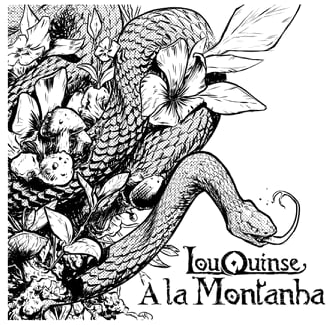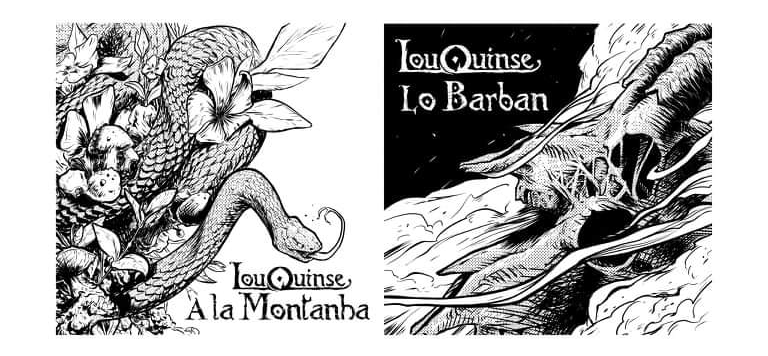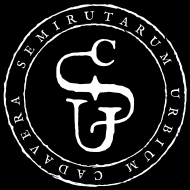[EN] Here is the second part of the interview to Lou Quinse. The first part is available at this link.
[IT] Ecco la seconda parte dell’intervista a Lou Quinse. La prima parte è disponibile a questo link.

Many of you are part of the punk hardcore scene. A much more “enveloping” environment, all-ecompassing from a certain point of view, surely more meaningful than the metal one, which is made by some occasional events and a more shallow and commercial lifestyle. How do you bring hardcore and a DIY attitude into your musical project?
You’re surely right when you say it’s an enveloping environment, in fact it brings us in, and not the contrary!
Fact is that when we were young metalheads and we started, 15 years ago pretty much, in Turin there was a club scene which borrowed a lot from the punk scene in practical and attitudinal sense, so we lived in a sort of golden bubble with a certain level of self-management which made us think everything was like that. Such a shock when we started hanging “outside”, often among exploiters of any kind, sketchy places and hyper-competitive bands!
Then thanks to the NoTav struggle we got closer to the punk and DIY scene. We first attended sporadically and then we became a part of it, and we learnt that fun, relaxing and enjoyable gigs could really happen, that we could exchange ideas and info with others, that the money you make at an event don’t have to make the living of someone who decided to exploit the passion of young metalheads to live, but that they can be used to help comrades in need, the struggles, to make a radio and productions live… and who stops now?
Then if from the side of playing live you could play in bad conditions but at least you could play, from the “record” side we lived and live a much more extreme and frustrating situation: in our experience who says that is able to fully produce your work is a scoundrel who doesn’t contribute in anything creative and useful, but who is there only to get money from you.
Self-production for us means to handle our work completely, to learn seriously (more or less) to do that, to plan it, to enter the absurd mechanisms of the so-called music industry and understand them.
And also, mostly co-producing, cooperate: our albums are a work that goes way beyond who plays them, which involves in a horizontal way graphic designers, artists, sound engineers and independent labels, who are free to express themselves in something truly shared.
Lately, we have seen the growth of an international revolutionary black metal phenomena, which we can define as “RABM”. Are you following the international scene? What do you think about it? And what do you think about the Italian black metal situation?
Honestly, as it often happens, we’re a bit late in reading the phenomena around us! We’re seeing tons of great bands releasing good quality music and having an excellent political attitude, which makes us happy.
It is truly noticeable that in all genres that are part of the metal music, it’s in Black Metal that you have a movement that defines itself on the bases of its content and revolutionary approach.
Of course, you have bands like this in any subculture of our huge family, but to see the birth of opposition and a different way of seeing things in a scene so ravaged by the far right, it’s truly inspiring. And we are seeing this happening in a reciprocal way with the audience too: there are many comrades that begin to find an interest and passion for black metal, which is something that a few years ago was impossible to imagine, and this is definitely because of the new sense that RABM is injecting in the scene.
You are often vocal about your political positioning, both through your original lyrics and in re-doing traditional anarchist songs. How much is important for Lou Quinse to express your ideas? What other choices connect your production and your political life?
Actually, in all of our production we only have one original lyrics, which is the “Giga Vitona” one, while all the others are lyrics taken from the various repertoires we take inspiration from. In this sense what we do is basically that we pick a version -because in traditional music the songs are sung in different ways- and then we modify it slightly, often replacing religious exclamations with profanities!
Lou Quinse has its own ideas, which are also ours, but mostly its. Let me explain: we re-interpret and report themes that are not ours in the original sense, but which derive from other people before us, people who underlined and sang about the injustice and rebellions of their times, which still have, in our opinion, a universal and active value, despite the passing of time.
We feel then to support all the musical self-managed projects, compilations, gigs, free radios, DIY punk and metal, which are the places for cultural re-appropriation and for partying of the exploited ones.
Militancy is on the other hand, a personal and individual topic (consider that only as musicians, through formation changes and the development of things, no fewer than 16 people are and have been Lou Quinse!), which affects the band through propositions, participation to events, the active friendships, the share of common interests.
Antifascism should be the lowest common denominator of any decent band. And up to here, in the “left”, I think we all are there, from the liberals to anarchist and communist bands. What can define a truly revolutionary metal scene in your opinion? What could make the difference between a “leftwing” alternative market and a truly revolutionary scene?
(Drugs) The revolution! Only suppressing the capitalist system could really make us free to play music to play music, without the market dynamics and other horrors. Then it is up to anyone to consciously choose a revolutionary ideology also to do this, also to seize the possibility to make music freely.
We think that in order to live our presence in the metal scene in a revolutionary sense, we must renounce delegating.
The bands find themselves alienated too often from the creative process, relying on scoundrels and exploiters because they can’t conceive a separation between the medium of money, of the label, of the booking agency, to affirm their own aesthetic (or not) ideas.
In this sense, luckily, in the last years, we’ve seen encouraging and positive examples, which bring our hopes up.
You published 2 albums and an EP. Which news are you bringing to us?
We recently have published a recording of a radio session we made in April 2021 for the Radio Blackout’s Home Jam broadcast.
This was only a digital release that we called “Ecce! Equus viridis” and it was a “pay-what-you-want” initiative for the free radios.
Between May and June, we will also release a 7″ EP with two songs, a small work in terms of timing but that involved the work and cooperation of many friends: sound-wise it is recorded by the always impeccable Tino Paratore, and this time it is not only mastered but also mixed by the master Tom Kvalsvoll, the guru of the most extreme Scandinavian sound.
The artwork, which we are eager to reveal, is made by Davide 0.Lo Mat Di Vincenzo, as we did for “Lo Sabbat”, while lettering was made by Giulia Salvatore, which worked on the artwork of “Ecce! Equus viridis”, and for the first time we will work with a DIY serigraphy, thanks to HvLab and to our friend Desi, while Marcello Ruvidotti, the author of the “Lo Boier” music video, is already working on some scripts… so a very exciting collective work to which we add the participation of many independent labels for co-production and distribution.
Musically and inspiration-wise this wants to be the testament of the formation who enlivened “Lo Sabbat” and at the same time the first step of the current one, before we travel on a long trip towards the course of the immigration from the south of Europe to the American continent and back…
Are there any bands you’d like to suggest?
We lately have been impressed by the album of folk blacksters DUIR and from the sci-fi performance of “La Morte Viene dallo Spazio”, while on the folk-contaminated side we suggest the very traditional duo Brotto-Lopez from the Occitan region and the stoner-esque CxK whom we are listing to lately, as well as the Mongolians The Hu and Suld, the first albums of the “blundered” Epirotes Villagers of Ioannina City, and the ritualistic deutsch-danish-norwegian Heilung, just to throw in some sprightly worldwide names, moderately mainstream. For the rest, we listen almost only to dead bands, better if DIY.
So we came to an end, anything to add?
Can we say “For Satan, for Anarchy” in an interview?

![]() Remember to set a reminder for the EP Premiere (link here)!
Remember to set a reminder for the EP Premiere (link here)!

Molt di voi frequentano l’ambiente punk hardcore. Un ambiente molto avvolgente, totalizzante da un certo punto di vista, sicuramente più pregnante di quello metal fatto di eventi sporadici e un lifestyle decisamente superficiale e reificato. Come portate l’hardcore e la mentalità DIY nel vostro progetto musicale?
Dici bene quando dici che è un ambiente molto avvolgente, e infatti è lui che porta noi e non viceversa!
Il fatto è che quando abbiamo cominciato da giovani metallari, 15 anni fa più o meno, a Torino c’era una scena club che aveva mutuato moltissimo in senso pratico e di attitudine dalla scena punk, e vivevamo in una bolla dorata con un certo livello di autogestione che ci faceva pensare che tutto il mondo fosse così. Che shock quando abbiamo cominciato a girare “fuori”, spesso tra sfruttatori di ogni tipo, posti ambigui e altre bands inutilmente iper competitive!
Poi grazie alla lotta NoTav ci siamo avvicinat in modo più deciso alla scena punk e DIY, abbiamo cominciato prima ad apparire sporadicamente e poi a farne veramente parte, e abbiamo imparato che dei concerti divertenti, rilassati e piacevoli si potevano davvero fare, che con gli/le altr si potevano scambiare idee, informazione, che i soldi che si fanno ad un’iniziativa non servono a far tirare a campare un qualcheduno che ha deciso di sfruttare la passione dei giovani metallari per vivere, ma per aiutare compass in difficoltà, per collaborare alle lotte, per tenere vive radio e pubblicazioni…E chi smette più?
Se poi dal punto di vista live nell’ambiente commerciale si suonava male ma almeno si suonava, dal punto di vista diciamo discografico si viveva e si vive una situazione ancora più estrema e frustrante: nella nostra esperienza chi sostiene di poterti produrre integralmente è un cialtrone che non mette nulla di creativo e utile nel processo di produzione di un disco e cerca sempre e solo di spillarti quattrini.
Autoprodursi per noi invece significa gestire completamente il nostro lavoro, imparare seriamente (più o meno) a farlo, a progettarlo, addentrarci negli assurdi meccanismi della cosiddetta industria discografica e comprenderli. E poi, soprattutto co-produrre, collaborare: i nostri dischi sono un’opera che va molto oltre chi li suona, che coinvolge in senso orizzontale grafici, artisti, fonici e etichette indipendenti, che si sentono libere di esprimere loro stesse in un qualcosa di realmente condiviso.
Negli ultimi anni sta prendendo piede internazionalmente il fenomeno del black metal schierato in senso rivoluzionario, catalogabile sotto al termine ombrello “RABM”. Seguite la nascente scena internazionale? Cosa ne pensate? E della situazione italiana che idea vi state facendo?
Onestamente, come spesso ci accade, siamo un po’ in ritardo sulla lettura dei fenomeni che ci circondano! Stiamo vedendo però tonnellate di ottimi gruppi uscire con proposte di qualità musicale e attenzione politica davvero interessanti e non possiamo che esserne felici.
È davvero notevole il fatto che fra tutti gli stili che compongono l’universo della musica metal, proprio nel black sia nata una corrente che si autodefinisce in base al contenuto e all’approccio rivoluzionari. Chiaramente esistono gruppi schierati in questo senso in ogni sottocultura della nostra sterminata famiglia, ma che all’interno di una scena così funestata da presenze di estrema destra nasca e si sviluppi sempre più un’ opposizione e un modo altro di vedere le cose, è davvero emozionante. E questo lo vediamo anche accadere in senso reciproco con il pubblico: sono davvero tante le compagne e i compagni che cominciano ad interessarsi e ad appassionarsi al black metal, qualcosa fino a qualche anno fa impossibile anche solo da immaginare, e questo sicuramente grazie al senso nuovo che l’ RABM sta dando alla scena.
Esplicitate spesso il vostro punto di vista politico, sia tramite i testi originali, che nei rifacimenti delle canzoni anarchiche tradizionali. Quanto è importante Lou Quinse per esprimere le vostre idee? Quali altre scelte coniugano la vostra produzione e la vostra politica?
In realtà in tutta la nostra produzione esiste un solo testo originale, che è quello della “Giga Vitona”, mentre tutti gli altri sono testi dei vari repertori da cui prendiamo spunto, e in questo senso quello che facciamo è soprattutto scegliere la versione, perché nella musica tradizionale i brani vengono cantati in modi differenti, e modificarli leggermente, soprattutto sostituendo esclamazioni religiose con bestemmie!
Lou Quinse ha le sue idee, che sono anche le nostre, ma soprattutto sue. Ci spieghiamo: noi reinterpretiamo, riportiamo, temi che non sono nostri nel senso originale ma che derivano da altri prima di noi, che hanno sottolineato e cantato le ingiustizie e le ribellioni dei loro tempi, che continuano, secondo noi, ad avere valore universale e attivo, a dispetto del passare del tempo.
In questo senso per noi è fondamentale esprimere le idee di questo magma popolare e tradizionale rispetto alla nostra contemporaneità, che piuttosto ne trae insegnamento e ispirazione, al massimo le contamina, appunto le reinterpreta, ma non le sostituisce.
Ci sentiamo quindi di sostenere e sosteniamo tutte le realtà musicali autogestite, compilations, concerti, radio libere, le scene punk e metal DIY, che sono i luoghi di riappropriazione culturale e di festa di sfruttati e sfruttate.
La militanza invece è un discorso personale e individuale (tieni conto che solo come musicisti, con l’alternanza delle varie formazioni e il divenire delle cose Lou Quinse sono e sono state ben 16 persone!), che incide poi sul gruppo attraverso le proposte, le partecipazioni alle iniziative, le amicizie attive, gli interessi comuni.
L’antifascismo dovrebbe essere il minimo comune denominatore di ogni band decente. E fin qui, a “sinistra”, diciamo che che ci siamo tutt, dal liberal alle band anarchiche e comuniste. Secondo voi cos’è che può invece definire come rivoluzionaria una scena metal? Cosa può fare la differenza tra la proposta di un mercato alternativo “di sinistra” e una scena veramente rivoluzionaria?
(La droga) La rivoluzione! Solo la soppressione del sistema capitalista può portarci ad essere veramente libere di fare musica per la musica, senza più dinamiche di mercato e altri orrori. Poi sta a ognun in coscienza decidere se aderire ad un’ ideologia rivoluzionaria anche per questo motivo, anche per appropriarsi della possibilità di fare musica in modo libero.
Come poi vivere in senso più rivoluzionario la nostra appartenenza alla scena metal, crediamo possa passare dalla rinuncia alla delega.
Troppo spesso le band si trovano spaesate al di fuori del processo creativo, si mettono in mano a cialtroni e sfruttatori perché non concepiscono la separazione dal media del denaro, dell’etichetta, della booking per affermare le proprie idee, estetiche e non.
In questo senso, fortunatamente, negli ultimi anni vediamo esempi incoraggianti e positivi, che ci fanno ben sperare.
Avete all’attivo 2 album e un EP. Quali novità avete in serbo per noi?
Di recente abbiamo pubblicato la registrazione di una radio session fatta ad aprile 2021 nel programma Home Jam di Radio Blackout. È uscita solo in digitale sotto il titolo di “Ecce! Equus viridis” a offerta libera benefit libere frequenze.
Tra maggio e giugno poi uscirà un 7” contenente due canzoni,un lavoro piccolo a livello di durata ma che vede l’impegno e la collaborazione di molti amici e amiche: a livello di suoni è registrato dal sempre impeccabile Tino Paratore e stavolta non solo masterizzato ma anche mixato dal maestro Tom Kvalsvoll, guru del sound norreno più estremo.
Le grafiche, che non vediamo l’ora di rivelarvi, sono ad opera di Davide 0.Lo Mat Di Vincenzo, come per “Lo Sabbat”, mentre il lettering di Giulia Salvatore, che si è occupata della copertina di “Ecce! Equus viridis” e per la prima volta ci confronteremo con la serigrafia DIY, grazie ad HvLab e alla nostra amica Desi, mentre Marcello Ruvidotti, l’autore del video de “Lo Boier”, è già lì che scrive sceneggiature… insomma un lavoro davvero collettivo ed esaltante, a cui si aggiunge la partecipazione di moltissime realtà indipendenti alla coproduzione e distribuzione.
A livello musicale e di ispirazione vuole essere il testamento della formazione che ha animato “Lo Sabbat” e contemporaneamente il primo passo di quella attuale, pronta ad imbarcarsi in un lungo viaggio sulle rotte dell’immigrazione dal sud dell’Europa al continente americano e ritorno…
C’è qualche band che ci stiamo perdendo e che volete consigliare?
Ultimamente siamo rimasti impressionati dal disco dei folk blacksters DUIR e dalle performances fantascientifiche de La Morte Viene dallo Spazio,mentre per il versante folk-contaminato ti direi per l’area occitana il duo super trad Brotto-Lopez e gli stoneroidi CxK sono tra i nostri ascolti del momento, con i mongoli The Hu e Suld, i primi dischi degli svarionanti epiroti Villagers of Ioannina City, e i ritualici tedescodanesenorvegese Heilung, solo per buttare un po’ di nomi casuali gagliardi worldwide, moderatamente mainstream. Per il resto ascoltiamo quasi solo gruppi morti, sicuramente meglio se DIY.
Siamo giunt alla fine di questa intervista, volete aggiungere qualche ultimo pensiero?
“Per Satana, per l’Anarchia” si può dire in un’intervista?

![]() Ricorda di impostare un reminder per la Premiere dell’EP (link qui)!
Ricorda di impostare un reminder per la Premiere dell’EP (link qui)!

